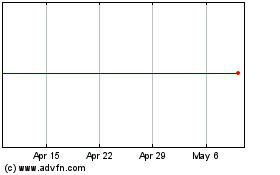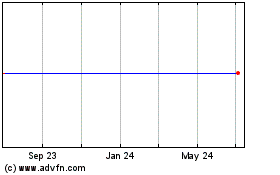Apple's New TV Push Boosts Challenges To Pay-TV Business
September 01 2010 - 4:32PM
Dow Jones News
Apple Inc.'s (AAPL) push to offer new, prime-time TV shows over
the Internet for 99 cents apiece is part of a wave of web video
offerings challenging the television industry's traditional
subscription model, which has withstood the onslaught of digital
media alternatives better than other old-media businesses.
Apple Chief Executive Steve Jobs, who has called Apple TV a
hobby since introducing it in 2006, announced on Wednesday the
relaunch of a discounted version of the device. Priced at $99, down
from $229, Jobs said the new, more compact Apple TV will hit stores
in a month, enabling consumers to watch online video on their
living room TV sets.
Both Walt Disney Co.'s (DIS) ABC and News Corp.'s (NWS, NWSA)
Fox networks signed on for a six-month trial of making hit shows
available for rent through the device at 99 cents apiece--the same
price Apple used to sell single songs on iTunes and revolutionize
the music business. Currently, most TV shows sell on iTunes for
$1.99 or $2.99 per episode. (News Corp. owns Dow Jones & Co.,
publisher of The Wall Street Journal and Dow Jones Newswires.)
Apple's new TV foray comes as Internet access through the
TV--which has been anticipated for a while--appears to be entering
the mainstream for this holiday season. Forrester Research predicts
that the number of U.S. homes with web-connected TVs--only two
million at the beginning of this year--will soar to 43 million by
2015 and numerous set-top devices that enable Internet access are
already available.
Meanwhile, a host of technology companies such as Google Inc.
(GOOG), Amazon Inc. (AMZN), Hulu LLC and Netflix Inc. (NFLX) are
ramping up web TV offerings of their own in a sign that excitement
is growing for this nascent market. Many web video players deny an
ambition to compete with traditional pay-TV distributors, such as
cable and satellite companies, but the confluence of emerging
alternatives, coupled with the weak consumer economy and rising
monthly TV bills, suggests that the Internet is emerging as a
threat to the media industry's largest profit engine.
For their part, pay-TV network owners and distributors, along
with many analysts, argue that competition posed by web video is
greatly exaggerated and the vast majority of viewers still watch
mostly traditional TV. While eMarketer estimates that more than 72
million U.S. adults will watch full-length TV shows online next
year--roughly a quarter of total viewers--that online watching
represents a small fraction of their total viewing.
"We're still just playing around the edges of the business,"
said Craig Moffett, analyst with Sanford C. Bernstein. "Apple's 99
cents offering squarely positions the service as an occasional-use
supplement to existing consumption patterns rather than a
replacement to the cable system."
The selection of popular programming available on the web
without a traditional TV subscription is also limited, and there is
no sign that substantial numbers of consumers are canceling TV for
a broadband-only subscription.
Still, the industry is vulnerable. While revenue is growing due
to price increases and added services, the overall U.S. pay-TV
market suffered its first-ever drop in total subscribers in the
second quarter due to the weak economy, SNL Kagan recently
reported. Meanwhile, a generational shift seems under way as
younger consumers adopt digital over traditional media.
Anticipating the increased interest in online viewing, Comcast
Corp. (CMCSA) and other pay-TV providers and networks have
collaborated on putting cable programming online behind a pay wall,
requiring users to confirm that they have a TV subscription in
order to access shows online on any connected device--a concept
known as "TV Everywhere." Time Warner Inc.'s (TWX) "TV Everywhere"
offering is available in 20 million homes now.
Not participating in Apple's TV push are broadcast network
owners CBS Corp. (CBS) and General Electric Co.'s (GE) NBC
Universal, and all cable networks, showing concerns exist within
the industry that offering programs that cheaply could undermine
the lucrative pay-TV subscription model. Over the past 10 years,
the cost of pay-TV services has risen 43%, according to statistics
released by the government this spring.
At ABC and Fox, some executives opposed participation in Apple's
trial, according to people familiar with the matter, but leaders at
their corporate parents pushed ahead with the agreement. ABC is
owned by Disney, where Jobs is the company's largest shareholder
and a board member. Meanwhile, News Corp. Chief Executive Rupert
Murdoch views Apple as a key partner for his publishing operations,
where mobile devices like the iPad have opened opportunities for
new business models.
"We think the rest of the studios will see the light and get
onboard," Jobs said.
-By Nat Worden, Dow Jones Newswires; 212-416-2472;
nat.worden@dowjones.com
CBS (NYSE:CBS)
Historical Stock Chart
From Jun 2024 to Jul 2024

CBS (NYSE:CBS)
Historical Stock Chart
From Jul 2023 to Jul 2024
